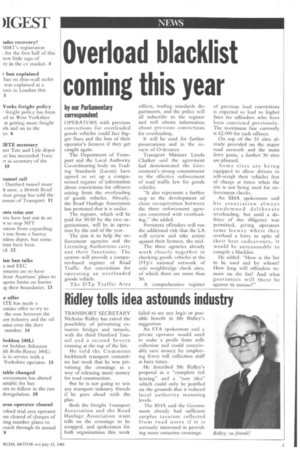Overload blacklist coming this year
Page 5

If you've noticed an error in this article please click here to report it so we can fix it.
by our Parliamentary correspondent
OPERATORS with previous convictions for overloaded goods vehicles could face bigger fines and the loss of their operator's licences if they get caught again.
The Department of Transport and the Local Authority Co-ordinating body on Trading Standards (Lacots) have agreed to set up a computerised register of information about convictions for offences arising from the overloading of goods vehicles. Already, the Road Haulage Association has protested that it is unfair.
The register, which will be paid for 50:50 by the two organisations, will be in operation by the end of the year.
The aim is to help the enforcement agencies and the Licensing Authorities carry out their functions. The system will provide a computer-based register of Road Traffic Act convictions for operating an overloaded goods vehicle.
The DTp Traffic Area offices, trading standards departments, and the police will all subscribe to the register and will obtain information about previous convictions for overloading.
It will be used for further prosecutions and in the review of 0-licences.
Transport Minister Lynda Chalker said the agreement had demonstrated the Government's strong commitment to the effective enforcement of road traffic law for goods vehicles.
"It also represents a further step to the development of close co-operation between the three enforcement agencies concerned with overloading," she added.
Persistent offenders will run the additional risk that the LA will review and take action against their licences, she said.
The three agencies already work closely together in checking goods vehicles at the DTp's national network of axle weighbridge check sites, of which there are more than 50.
A comprehensive register of previous load convictions is expected to lead to higher fines for offenders who have been convicted previously. The maximum fine currently is £2,000 for each offence.
On top of the 51 sites already provided on the major road network and the main ferry ports, a further 30 sites are planned.
Some sites are being equipped to allow drivers to self-weigh their vehicles free of charge at times when the Site is not being used for enforcement checks.
An RHA spokesman said his association always condemned deliberate overloading, but until a defence of due diligence was permitted, giving operators some leeway where they overload a lorry in spite of their best endeavours, it would be unreasonable to compile a blacklist.
He added: "How is the list to be used and by whom? How long will offenders remain on the list? And what guarantees will there be against its misuse?"




















































































